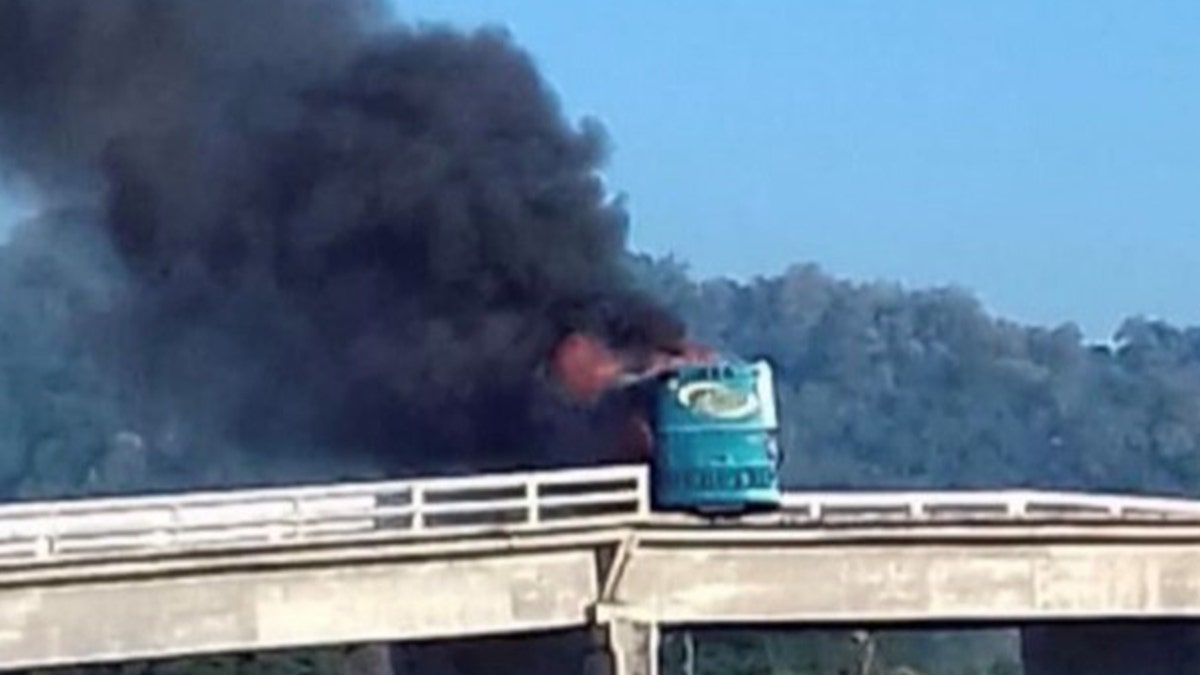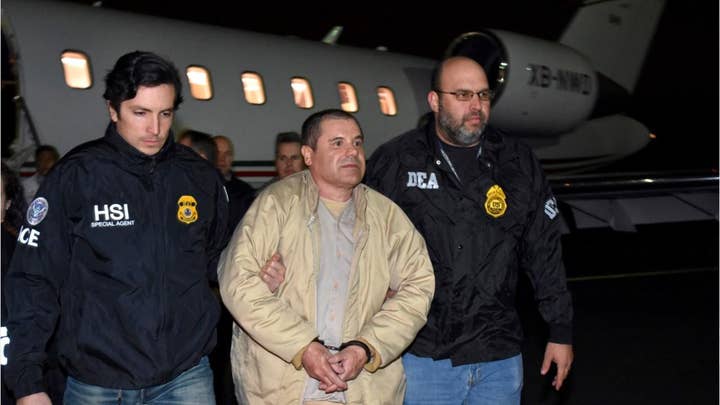They behead, dismember, kidnap for ransom, instigate deadly shootings and bombings and control entire communities – yet Mexican cartels are not designated foreign terrorist organizations (FTOs) in the United States.
The classification issue previously gained little traction, despite increased concerns over U.S. border security, but a renewed vocal push by some retired law-enforcement officials shed light on the question once again.
“The level of murders and disappearances in Mexico along with the terrorist activities like dumping heads on the roads, chopping people up and dumping humans in acid combined with unprecedented levels of death in America from the drugs justifies this designation,” Derek Maltz, former head of the Drug Enforcement Agency (DEA)'s Special Operations Division, told Fox News. “Since the Mexican Cartels pose an immediate threat to U.S. national security and are to blame for the importation of synthetic opioids, which helped bring about the greatest drug epidemic in U.S. history, we need great authorities to deal with them.”
Perhaps now more than ever, all eyes are on the U.S.-Mexico border amid the long-running debate over who is and isn’t authorized to come into the United States, and the security issues posed by Mexican cartels.
Controversy has swirled around issues of legal and illegal migration from Central America and Mexico to the United States – punctuated by the ongoing debate over border wall funding, shocking revelations on cartel operations from the trial of Joaquin “El Chapo” Guzman in New York City, and the notion that thousands in migrant “caravans” have continued their expedition to the United States border.
A study published by the U.S. Army's Strategic Studies Institute warned about a rise in car bombings tied to drug cartels inside Mexico over the past decade, with some of those incidents unfolding near the U.S. border.
The unease has been illuminated further by Sunday’s announcement that the Pentagon will deploy around 3,750 additional U.S. troops to the border to provide support to Customs and Border Protection (CBP).
According to Lenny DePaul, a retired chief inspector/commander in the U.S. Marshals Service, the non-designation of Mexican cartels “seems to be a political one and needs to be rectified sooner rather than later.”
“These cartels have killed American ICE agents, border patrol officers, Mexican law enforcement authorities and thousands of civilians. They kidnap, kill and mutilate innocent victims,” DePaul contended. “They certainly operate just like Al Qaeda, Taliban, and other terrorist groups, using similar tactics for political influence making them far worse than a common criminal organization that many politicians want to believe they are.”
A spokesperson for the State Department told Fox News that FTO designations “play a critical role in our fight against terrorism and are an effective means of curtailing support for terrorist activities and pressuring groups to get out of the terrorism business.”
“The Department of State regularly reviews available information and intelligence, from many sources, evaluating all credible, verified, and corroborated information in its entirety,” the representative said. “We do not comment on internal deliberations.”
Efforts to cement their statuses as FTOs in the past have fallen on deaf ears.
In March 2012, Rep. Michael McCaul introduced a bill to direct the secretary of state – then Hillary Clinton – to designate as foreign terrorist organizations certain Mexican drug cartels.
“While not driven by religious ideology, Mexican drug cartels operate in the same manner as Al Qaeda, the Taliban or Hezbollah each sharing a desire, and using similar tactics to gain political and economic influence. These are acts of terrorism,” McCaul, R-Texas, testified before introducing the legislation. “This designation could bring separate charges against anyone providing ‘material support or resources’ to FTOs. Provide an additional penalty of up to 15 years in prison or a life sentence if their actions resulted in death, authorize the deportation of any foreign member of an FTO and require banks to freeze any funds tied to FTOs.”
The proposed bill drew sharp opposition from some members of the Mexican government, with some political figures contending it then would make drug consumers in the U.S. “financiers of terrorist organizations” and gun dealers “providers of material support to terrorists.” Officials have long maintained that drug cartels – while incredibly brutal in their tactics – are motivated only by money, and are not driven by political ideology or a quest to destabilize or usurp a government.
WHY RUSSIA, CHINA ARE FIGHTING U.S. PUSH AGAINST VENEZUELA'S MADURO
The bill also drew condemnation from lawmakers in the U.S., including Democratic Rep. Henry Cuellar of Texas, who expressed concern it would then damage diplomatic relations and further complicate Mexico’s own efforts to combat cartels. Ultimately, the bill failed to pass.

The border city of Juarez faced a string of violent drug crimes. (Spencer Platt/Getty Images, File)
The seven specified groups all remain in operation to varying capacities now, including the Sinaloa cartel -- once helped by El Chapo -- and the prominent Los Zetas and Juarez cartels.
However, the most important effect of a terrorist organization classification, its proponents contend, is giving to go-ahead to law enforcement to take more extensive measures to fight the groups.
As it stands, Mexican drug cartels are classified as drug trafficking organizations (DTOs) despite being involved in a broadening array of criminal activity beyond the realm of the illicit drug trade – from extortion and human trafficking to fraud, corruption and the smuggling of other goods and services. Many groups are also classed as Transnational Criminal Organizations (TCOs), but some security experts have claimed the designation provided little authority to law enforcement or the Pentagon to take forceful action the way they would a formal terrorist outfit.
“By designating the cartels a foreign terrorist organization, the U.S. could authorize additional resources and assets to go after these groups. It would elevate the priority. The [Defense Department] has plenty of authorities to go after terrorists which law enforcement could not normally use in a transnational crime case,” Maltz said. “We want to shut down the supply.”
A report released late last year by the DEA emphasized that the influence of cartels continued to grow across almost every region of the U.S., and the bodies continued to pile up. The DEA asserted that in 2016, approximately 174 people died every day from drug poisoning. And, in 2017, synthetic opioids such as fentanyl were involved in nearly 30,000 deaths – outnumbering those caused by firearms, motor vehicle accidents, suicide and homicide.
COLOMBIA’S PEACE AGREEMENT BLOODIED BY DISTRUST, DRUGS - AND THE VENEZUELAN REGIME
Benjamin Ryberg, research director for The Lawfare Project, which identified itself as an anti-discrimination legal group, noted that such a designation “does appear justifiable under relevant laws.”
“The definition of ‘terrorist activity’ includes assassinations and the use of explosives, firearms, or other weapons "with intent to endanger, directly or indirectly, the safety of one or more individuals or to cause substantial damage to property,’” he pointed out. “As far as threatening the security of U.S. nationals, there have been reports of killings of U.S. nationals by Mexican cartel members. Whether or not national security is threatened by cartel activity strikes me as more of a policy question than a legal question, and could depend on how broadly or narrowly the term is defined.”
However, some analysts have argued that narco cartels generally are not terrorists, but criminals.
“Designated terrorist organizations intend to topple or significantly disrupt democratically-run governments. Most drug cartels are not involved in such activity, even avoid it as to not attract unnecessary attention to their criminal activities,” said David Gaddis, CEO of international protection firm G-Global Protection Solutions, and a former chief of enforcement operations at the DEA. “Most drug cartels are not involved in such activity, even avoid it as to not attract unnecessary attention to their criminal activities.”
Andrew Lewis, president of private intelligence firm the Ulysses Group and former deputy director of the Pentagon's counter narco-terrorism task force, stressed that the real question for lawmakers was whether the benefits of such a designation would outweigh the fallout.

Drug cartels like the Sinaloa have been known to torch buses and blow apart roadways. (Fox News)
“You are talking about tens of thousands or more entities that would be affected. Designated businesses could change names, there would be confusion on individuals with similar names, our database would get overwhelmed and the entity most impacted and likely punished would be the banking industry,” Lewis continued. “The amount of due diligence this would add would drive up costs, impacting small and medium banks very badly, and the government would look to fine banks for any violations because they have deep pockets. We already have drug kingpin sanctions laws and a program in place that addresses a small number of individuals and businesses.”
The Foreign Narcotics Kingpin Designation Act, which has been in place for about 20 years, is designed to “deny significant foreign narcotics traffickers, their related businesses, and their operatives access to the U.S. financial system and to prohibit all trade and transactions between the traffickers and U.S. companies and individuals.” The act also gives the Treasury Department the ability to freeze any assets of the cartels found in United States jurisdictions and to prosecute Americans who help the cartels handle their money.
CLICK HERE TO GET THE FOX NEWS APP
Nonetheless, a chorus of critics insisted that the problem has worsened, and more needs to be done.
“For years we have been spending resources to fight cartels, yet government leaders in Mexico have been taking bribes from the cartel leadership and they are still there,” Maltz added. “And, any time this issue has been brought up, people in DC run for cover.”















































